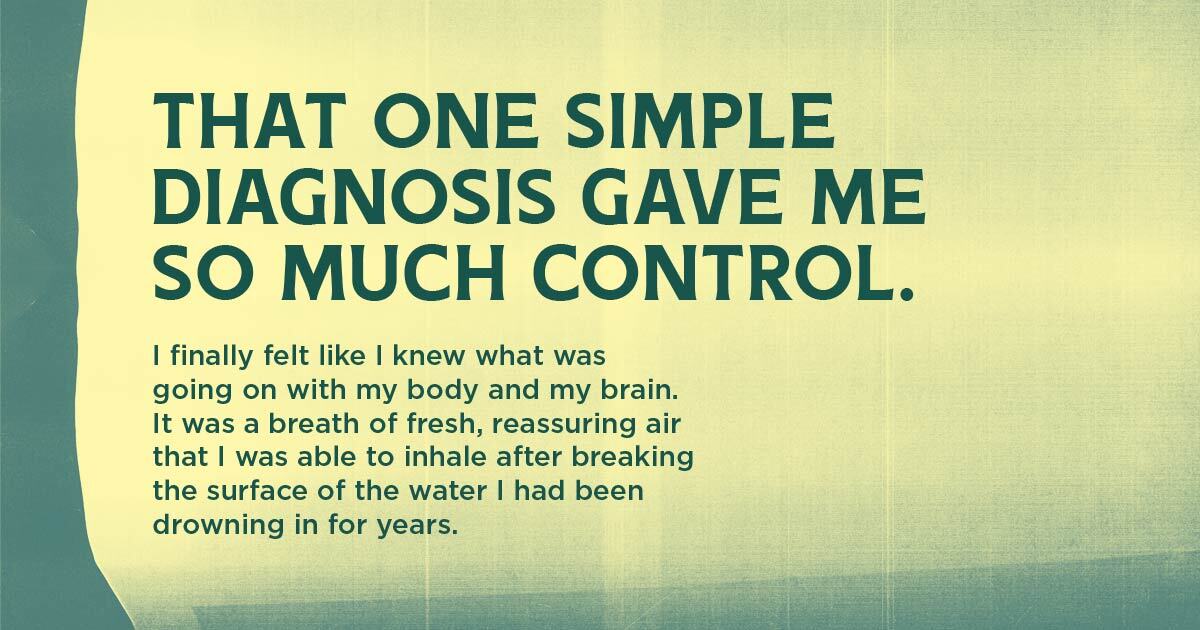Growing up I didn’t have a lot of control over the things that were happening to or around me.
I couldn’t control my parents’ divorce (which felt like both a blessing and a curse), I couldn’t control how many times my biological father would physically abuse me (which eventually included verbal and emotional abuse), and I couldn’t control the court-ordered visitation that occurred every other Thursday evening and every other weekend.
I first went to therapy my sophomore year of college and my therapist had a field day. It felt like every session she was giving me a new envelope containing a letter that stated: “Congratulations! You have been diagnosed with [insert name of mental illness]!” and attached would be a coupon that read: “Diagnosed with one mental illness? Get three more for free!”
It was exhausting and frustrating and I felt as though I was running circles around myself. I couldn’t control my depression or anxiety or OCD—and I had no idea what to do.
I was put into a group therapy session that met once a week called CBT (Cognitive Behavioral Therapy) and I met with my therapist once a month. Despite going to individual and group therapy, I still felt like I had no control over my life or mind. I was underwater, trying desperately to swim back up but every little thing that I couldn’t control was weighing me down by the ankles. And just when I would begin to see the surface and find the strength to kick faster and harder, something else would come along and drag me back down.
When I was 20, I started seeing a new therapist. After discussing all my previous diagnoses with her, and giving her a brief synopsis of my childhood, she paused and looked down at her notes.
“I think you have PTSD.”
There was silence in the office and my mind began to race. Sure, I had entertained the possibility that I might have PTSD, but I always dismissed it. Because surely that was a diagnosis for people who had been through way worse traumas than I had. Could my childhood even be categorized as traumatic?
The short answer? Yes.
I recall bursting into tears after processing what she had said. It all made sense. There were so many signs that I had naively pushed away and written off.
For example, when I was a child, I would lay in bed and “zone out” by staring up at the ceiling. One minute it would be early afternoon and the next my mom would be calling me to dinner. I thought what I had been doing was normal. My therapist called it dissociation. To this day, I will flinch and tense up when I hear a loud noise or someone gets too close to me. According to my therapist, that was an instinct I had adopted over years of physical and verbal trauma to prepare myself for impact. I also don’t feel comfortable around big men, especially when they get loud or drunk—which led my therapist to point out just how much bigger my biological father was than current me and child me.

That one simple diagnosis gave me so much control.
I finally felt like I knew what was going on with my body and my brain. It was a breath of fresh, reassuring air that I was able to inhale after breaking the surface of the water I had been drowning in for years.
Now, the diagnosis wasn’t a magical cure-all. I wasn’t able to snap out of my depression, ignore my anxious thoughts, or cease picking the skin off my lips—but I did begin to learn how to cope properly.
Being diagnosed with PTSD has opened up a whole new world of support. I’ve been able to seek out resources catered specifically towards my struggles. I have gained tools to help me learn how to live with my trauma. I have found stories of people talking openly about their experiences with PTSD and healing from it too.
There are so many things I can’t control or change. But I was able to reclaim this. And right now, that’s enough.
You’re more than your pain, more than what happened. You are strong enough to heal from the heavy you carry. We encourage you to use TWLOHA’s FIND HELP Tool to locate professional help and to read more stories like this one here. If you reside outside of the US, please browse our growing International Resources database. You can also text TWLOHA to 741741 to be connected for free, 24/7 to a trained Crisis Text Line counselor. If it’s encouragement or a listening ear that you need, email our team at [email protected].